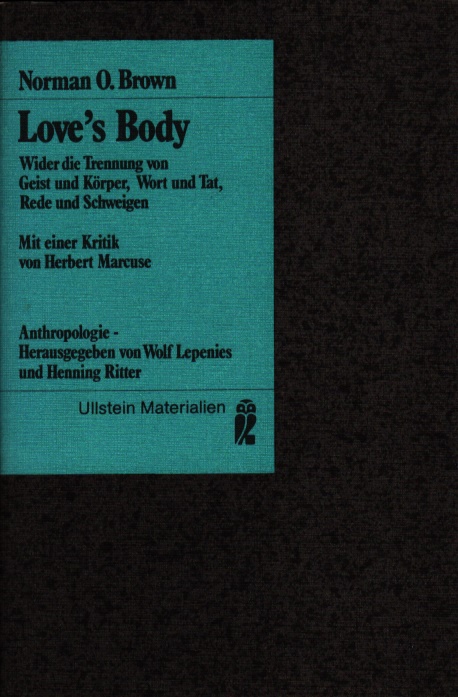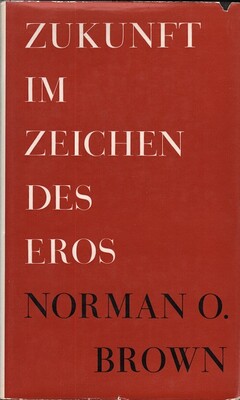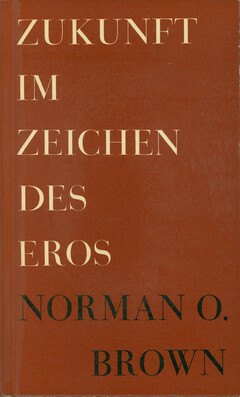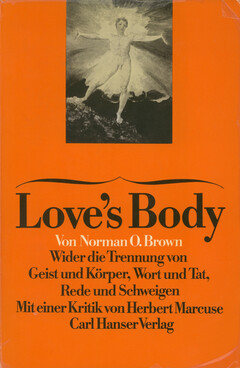Details
| Autor | Brown, Norman O. |
|---|---|
| Verlag | Random House |
| Auflage/ Erscheinungsjahr | 1979 |
| Format | 12,6 × 2,3 × 20,5 cm |
| Einbandart/ Medium/ Ausstattung | OLwd. mit goldgeprägtem Titel |
| Seiten/ Spieldauer | 258 Seiten |
| SFB Artikelnummer (SFB_ID) | SFB-007208_AQ |
Zu diesem Buch
»Love’s Body – nach ›Zukunft im Zeichen des Eros‹ das zweite Buch von Norman O. Brown – ist eine Provokation. Mit den Mitteln einer radikalisierten Psychoanalyse will es das Wirklichkeitsverständnis des gesunden Menschenverstandes wie der Wissenschaften destruieren und den Sinn für das Mysterium und das Geheimnis wiederherstellen. Norman O’Brown durchmustert philosophische, anthropologische und politische Grundvorstellungen auf die in ihnen verborgenen mythischen Gehalte, die unter dem Gewand der Rationalität weiter wirksam bleiben. Er kritisiert sie jedoch nicht aus der Perspektive historischer und politischer Wirklichkeit, sondern aus der Perspektive einer universalen Symbolik, die auf der menschlichen Körpererfahrung fußt. (…)«
Wikipedia zu diesem Werk
Literary critic Camille Paglia calls Love's Body "one of the most famous and influential books of my college years." Sam Keen notes that Love's Body is very different in approach from Brown's previous book, Life Against Death (1959): "The old style is no more. Gone are the rational arguments supporting the end of argumentation, the prose defending poetry, the reasoned appeals for ecstasy. In their place are aphorism, poetry, and free association. Playfully and with abundant exaggeration Brown paints a portrait of the divinely inspired schizophrenic who transforms the world by poetic imagination and by his refusal to accept the boundaries that define the normal (or average) sense of reality."
Brown commented of the book that, "I did feel when writing Love's Body some kind of obligation to undo what I had done in Life Against Death. I wanted to release any followers I had acquired or at least to confuse them. [...] I felt under some existential stress to write Love's Body in order to torpedo Life Against Death, to destroy it as a position."
Paul Robinson writes that Love's Body "makes quite clear that psychoanalysis was only a stage in Brown's development toward a rather curious (and radical) brand of religious mysticism. The very concrete body of Freudian psychology has been absorbed into the Mystical Body of traditional Christian theology. To be sure, Freud remains an important authority, and there is a racy (and confusing) display of sexual rhetoric. But the erotic language is largely metaphorical; as Brown himself says, 'Everything is symbolic...including the sexual act.' Most significant, Brown has been candid enough to make explicit the pronounced antipolitical assumptions which were only implicit in Life Against Death. He now argues that politics can never be the vehicle of liberation, not merely because political action is invariably corrupt, but also because politics don't really exist. Political revolutions are 'reorganizations of the theater, of the stage for human action. The matter remains the same.'"
Love's Body was criticized by Herbert Marcuse in the February 1967 issue of Commentary. Brown's reply to Marcuse appeared in Commentary's March 1967 issue.
Der Autor
Norman Oliver Brown (September 25, 1913 – October 2, 2002) was born in El Oro, Mexico, where his father was activ as a mining engineer. Beginning as a classical scholar, his later work branched into wide-ranging, erudite, and intellectually sophisticated considerations of history, literature, psychology, culture, and other topics. Brown advanced some novel theses and in his time achieved some general notability.
Life:Brown's father was an Anglo-Irish mining engineer. His mother was a Cuban of Alsatian and Cuban origin. He was educated at Clifton College,then Balliol College, Oxford (B.A., M.A., Greats; his tutor was Isaiah Berlin) and the University of Wisconsin–Madison (Ph.D., Classics).
In 1938, Brown married Elizabeth Potter. During the Second World War, he worked for the Office of Strategic Services as a specialist on French culture. His supervisor was Carl Schorske, and his colleagues included Herbert Marcuse and Franz Neumann. His other friends included the historians Christopher Hill and Hayden White as well as the philosopher Stuart Hampshire. At Wesleyan University, he befriended the composer John Cage, an association that proved fruitful to both. Brown became a professor of classics at Wesleyan. During Brown's tenure there, Schorske became a professor of history and the two engaged in a mutually beneficial interdisciplinary discourse.
Zum Erhaltungszustand
Im Modernen Fachantiquariat der SFB ist der Titel in mehreren gut bis noch recht gut erhaltenen antiquarischen Exemplaren verfügbar; innen jeweils ohne Anstreichungen und Anmerkungen




Kommentare
Schreiben Sie den ersten Kommentar!
Neuer Kommentar
Bitte beachten Sie vor Nutzung unserer Kommentarfunktion auch die Datenschutzerklärung.